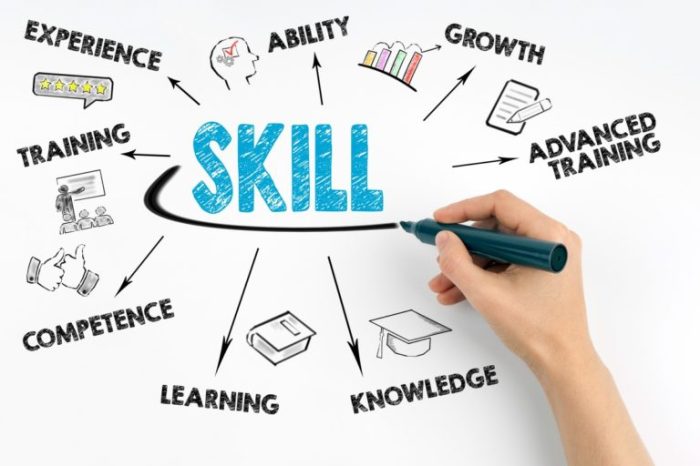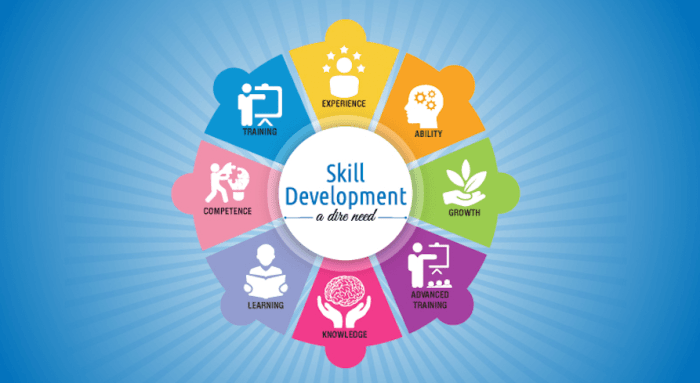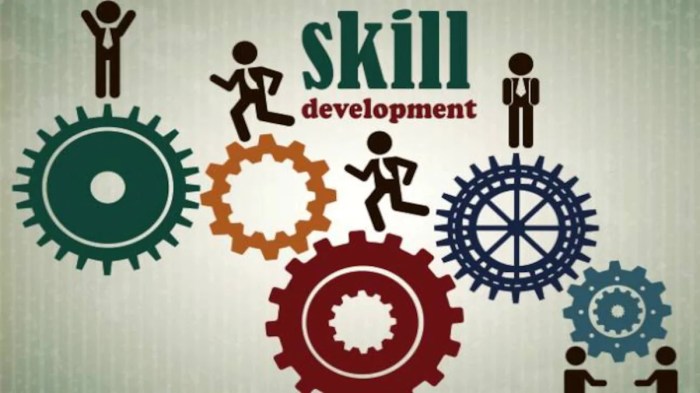Skill Development: It’s not just about learning stuff; it’s about leveling up your life, both personally and professionally. Think of it like this: you’re playing a game, and skills are your power-ups. Whether you’re aiming for a killer career or just want to become a more well-rounded human, developing new skills is the key to unlocking your full potential.
This exploration dives into the different types of skills, effective learning methods, and how to measure your progress—because who doesn’t love a good progress bar?
We’ll cover everything from hard skills like coding and data analysis to soft skills like communication and teamwork. We’ll look at how different learning styles and methods affect your success, and we’ll even explore some real-world examples of companies that have successfully implemented skill development programs. Get ready to discover how to make yourself (and your organization) awesome.
Importance of Skill Development for Individuals

In today’s rapidly evolving job market, continuous skill development isn’t just beneficial—it’s essential for individual success and overall well-being. Investing in yourself through learning new skills directly translates to a more fulfilling and prosperous future, impacting both your professional life and personal growth. The benefits extend far beyond simply landing a better job; they encompass increased earning potential, enhanced job satisfaction, and a stronger sense of self-efficacy.Skill development significantly boosts career advancement opportunities.
By acquiring in-demand skills, individuals become more competitive in the job market, opening doors to promotions, higher salaries, and more challenging roles. This proactive approach to learning demonstrates initiative and adaptability, qualities highly valued by employers. Moreover, mastering new skills can lead to career transitions, allowing individuals to pursue more fulfilling paths aligned with their passions and interests.
Skill Development and Career Advancement
Acquiring new skills directly translates to increased earning potential. Individuals with specialized skills are often compensated more generously, reflecting the value they bring to an organization. For example, a software engineer with proficiency in Python and machine learning can command a significantly higher salary than one with only basic programming skills. This financial benefit extends beyond immediate income; it also impacts long-term financial security and wealth accumulation.
Furthermore, the increased earning potential associated with skill development contributes to a higher standard of living and improved financial stability.
Skill Development and Job Satisfaction
Skill development plays a crucial role in improving job satisfaction. When individuals possess the skills needed to excel in their roles, they experience a greater sense of accomplishment and purpose. This mastery leads to increased confidence and reduced stress, contributing to a more positive work environment. The ability to tackle challenging tasks and contribute meaningfully to a team fosters a sense of belonging and job fulfillment.
Moreover, continuous learning keeps work engaging and prevents stagnation, making the job itself more rewarding.
Skill Development and Personal Growth
Beyond professional benefits, skill development contributes significantly to personal growth and overall well-being. Learning new skills boosts self-confidence and self-esteem, empowering individuals to tackle new challenges with greater assurance. This enhanced self-efficacy extends beyond the workplace, positively impacting personal relationships and other life aspects. The process of learning itself can be incredibly rewarding, fostering a sense of accomplishment and personal pride.
Moreover, the development of new skills often leads to the discovery of hidden talents and interests, enriching personal life and fostering a more holistic sense of self.
Highly Sought-After Skills, Skill Development
The job market constantly evolves, requiring individuals to adapt and acquire new skills. Understanding the skills currently in high demand is crucial for career success.Prior to listing these skills, it’s important to note that the specific skills in demand can vary based on industry and specific job roles. However, certain skills consistently remain highly valued across numerous sectors.
- Data Analysis and Interpretation: The ability to collect, analyze, and interpret data is crucial in many fields, from marketing and finance to healthcare and technology.
- Digital Marketing and Social Media Management: With the increasing importance of online presence, skills in digital marketing and social media management are highly sought after.
- Project Management: Effective project management skills are essential for coordinating teams and delivering projects on time and within budget.
- Cloud Computing: Proficiency in cloud computing platforms and services is increasingly important across various industries.
- Cybersecurity: With growing cyber threats, professionals with cybersecurity skills are in high demand.
- Artificial Intelligence (AI) and Machine Learning (ML): Knowledge and skills in AI and ML are becoming increasingly valuable across many sectors.
- Communication and Collaboration: Effective communication and collaboration skills remain essential for success in any field.
- Problem-Solving and Critical Thinking: The ability to analyze problems, identify solutions, and make informed decisions is highly valued.
Importance of Skill Development for Organizations

In today’s rapidly evolving business landscape, organizations that prioritize skill development gain a significant competitive edge. Investing in employee training and upskilling translates directly into improved organizational performance, increased productivity, and enhanced ability to adapt to market changes. A skilled workforce is the cornerstone of a thriving and resilient organization.Skill development plays a crucial role in boosting organizational performance across various metrics.
Improved employee skills lead to higher quality output, reduced errors, and increased efficiency. This, in turn, contributes to higher profitability and a stronger bottom line. Moreover, a skilled workforce is better equipped to innovate and adapt to new technologies and market demands, ensuring the organization remains competitive and relevant. Companies known for their robust skill development programs often report higher employee retention rates, further reducing recruitment costs and maintaining institutional knowledge.
Challenges in Implementing Effective Skill Development Programs
Organizations often face several hurdles in successfully implementing skill development initiatives. One major challenge is securing sufficient budget allocation for training programs, especially in times of economic uncertainty. Another significant obstacle is aligning training programs with the organization’s strategic goals and ensuring that the skills being developed directly contribute to the achievement of those goals. Effective communication and engagement with employees are also crucial for program success; a poorly communicated or poorly designed program can lead to low participation and ultimately, a poor return on investment.
Finally, measuring the effectiveness of skill development programs and demonstrating a clear return on investment (ROI) can be difficult, leading to skepticism about the value of such initiatives.
Strategies for Aligning Skill Development with Organizational Goals
Effective alignment of skill development with organizational goals requires a strategic and systematic approach. This begins with a thorough needs assessment to identify skill gaps and areas where training is most needed. This assessment should consider both current and future needs, anticipating changes in technology, market demands, and organizational strategy. Once these needs are identified, organizations can develop targeted training programs that directly address those gaps.
These programs should be designed to be engaging and relevant to employees, utilizing a variety of learning methods to cater to different learning styles. Regular monitoring and evaluation of the programs are essential to ensure effectiveness and make necessary adjustments. Finally, incorporating feedback from employees and managers is crucial for continuous improvement and ensuring that the programs remain aligned with the evolving needs of the organization.
For example, a company anticipating a shift to cloud-based systems might invest heavily in training employees on cloud computing technologies, directly contributing to a smoother transition and minimizing disruption.
Assessing Skill Development Effectiveness

So, you’ve invested time and resources in skill development programs. Now, how do you know if they actually worked? Measuring the effectiveness of these programs is crucial, not just for justifying the expense, but also for improving future initiatives. A robust evaluation framework allows you to pinpoint what’s working and what needs tweaking, ultimately leading to better employee performance and organizational success.A comprehensive evaluation should consider both individual and organizational outcomes.
This means assessing not only whether individual employees gained the targeted skills, but also how these improved skills translate into tangible benefits for the company. This multifaceted approach provides a clearer picture of the program’s overall impact.
Framework for Evaluating Skill Development Program Effectiveness
A solid framework for evaluating skill development programs involves a multi-stage process. First, you need clearly defined learning objectives – what specific skills should employees gain? These objectives should be measurable, achievable, relevant, and time-bound (SMART). Next, you’ll choose appropriate evaluation methods, aligning them with the learning objectives. Finally, you’ll analyze the data collected to determine the program’s effectiveness and identify areas for improvement.
This iterative process allows for continuous refinement and optimization of your skill development initiatives.
Methods for Measuring Impact on Individual Performance and Organizational Outcomes
Measuring the impact of skill development requires a blend of quantitative and qualitative data. Quantitative methods might include pre- and post-training assessments, measuring improvements in skills scores or test results. For example, a sales training program could track an increase in sales figures per employee post-training. Qualitative methods could involve employee feedback surveys, interviews, or 360-degree reviews, providing richer insights into the learning experience and its impact on employee confidence and job satisfaction.
Analyzing both types of data provides a more complete picture of the program’s effectiveness.
Key Performance Indicators (KPIs) for Tracking Skill Development Progress
Several KPIs can effectively track skill development progress. For individual performance, you could track metrics such as: improved efficiency (tasks completed per hour), reduced error rates, increased productivity, higher employee satisfaction scores, and improved performance ratings. At the organizational level, KPIs might include: increased overall productivity, improved customer satisfaction, higher employee retention rates, reduced employee turnover, increased profits, or a faster time to market for new products or services.
For example, a company implementing a leadership development program might track employee promotion rates or the number of employees taking on leadership roles within a specified time frame. Choosing the right KPIs depends on the specific goals of the skill development program and the organization’s overall strategic objectives.
FAQ Section
What’s the difference between hard and soft skills?
Hard skills are teachable abilities like coding or accounting. Soft skills are personality traits like communication and teamwork.
How can I identify skills gaps?
Self-assessment, feedback from others (managers, colleagues), and job descriptions for your desired roles are great ways to pinpoint areas for improvement.
How much time should I dedicate to skill development?
It depends on your goals! Even 30 minutes a day can make a difference. Consistency is key.
What if I don’t see results immediately?
Skill development takes time and effort. Stay persistent, adjust your approach if needed, and celebrate small wins along the way.
